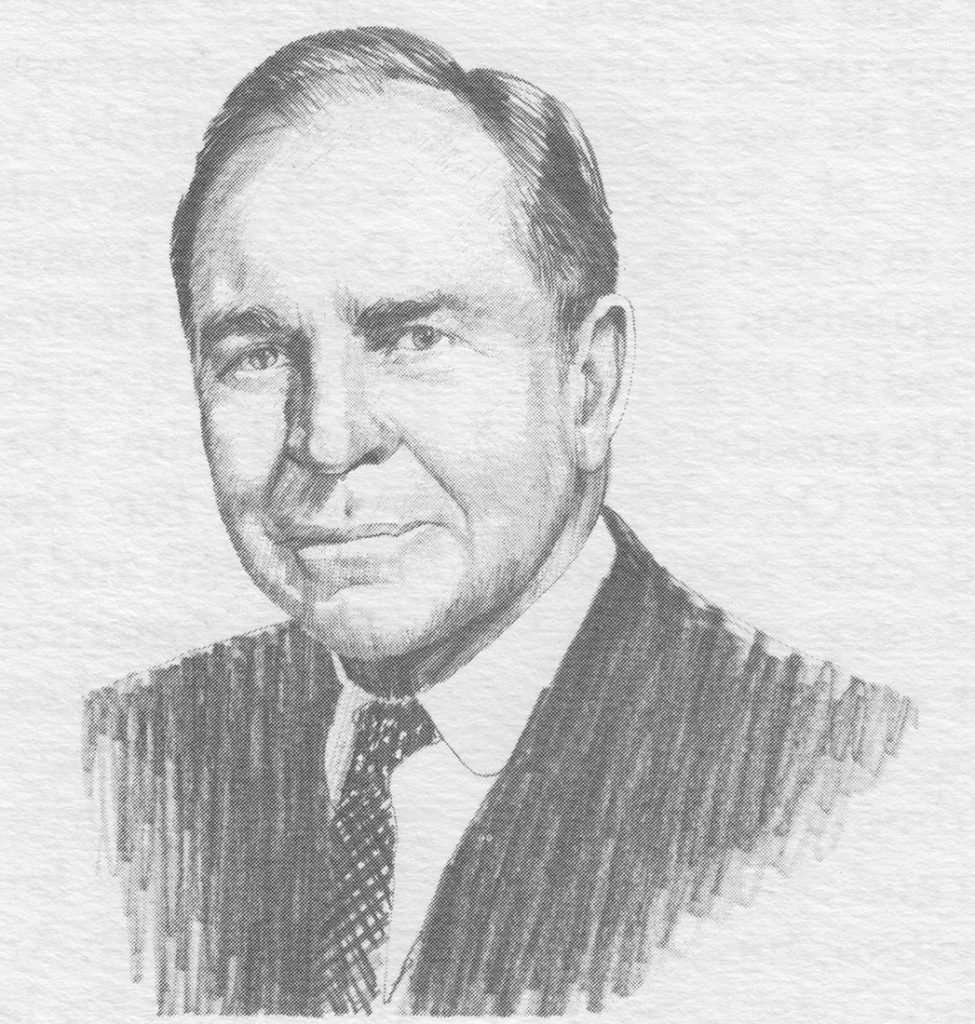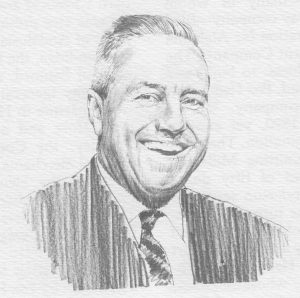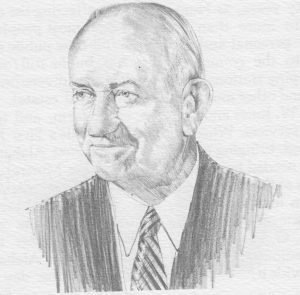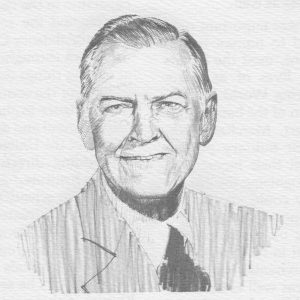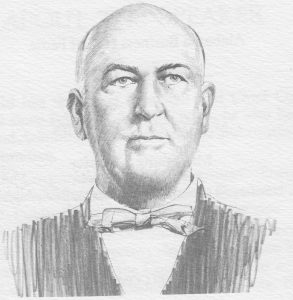To many observers, Jonathan Westervelt Warner – better known as Jack – is seen as an entrepreneur par excellence, a hard-nosed businessman who used a mixture of intuition, information, and guts to transform a single product, family business into a dynamic, diversified organization. Others view him as a traditionalist, a lover of art and history whose interests are as much with the past as with the present or future.
Undeniably, Jack Warner believes in tradition. Directing the activities of a corporation founded in 1884 by his grandfather, Warner follows in a family tradition of leadership. But the past three decades of growth under his leadership have presented a myriad of challenges in a constantly changing business world. Through the years, however, Warner was carefully groomed for his future role and the imprint he would one day make on the lives of so many.
“My mother gave me the ball early in life, and then let me run with it. Even when I tripped and fell,” Warner said in recalling her guidance. “It’s so easy for a parent to make an incompetent out of the son by dominating his position and decisions. My mother always let me make my own mistakes as well as forge my own successes.” That philosophy worked well, for under Warner’s direction Gulf States Paper Corporation began an era of unprecedented growth and development that continues to this day.
Born in Decatur, Illinois, Warner moved to Tuscaloosa at the age of 11 when his family opened Alabama’s first modern paper mill in 1929. Through the years, the Tuscaloosa mill was to grow and make the Gulf States one of the world’s leading producers of the familiar grocery bag and other products made from kraft paper.
Growing up around the Tuscaloosa facility, Warner learned about the paper industry through firsthand observation. He spent summers and holidays as a laborer in the mill while gaining a formal education at Culver Military Academy and Washington and Lee University. After military service in World War II, Warner returned to Tuscaloosa in 1946 to join the family business. In 1950 he became executive vice president, directing the day-to-day operations while, at the same time, making improvements and laying plans for the quantum jumps in growth the future would hold.
April 20, 1957, was to be a fateful Saturday for Warner: the company’s board of directors accepted the retirement of his mother, Mildred Westervelt Warner, as president and named Jack Warner in her place. Thus, he became the third president of Gulf States Paper Corporation.
Sensing the need to move into new markets to meet the challenges of the future, Warner embarked upon a bold program of expansion through the development of new products. The first such move was the Demopolis mill, which opened as a producer of pulp the year after Warner became president. This facility was soon expanded to allow the production of high-quality bleached paperboard for food packaging and achieved many innovative “firsts” in the industry.
Realizing the land resources of the corporation held great potential, Warner expanded its land holdings and extended the Gulf States presence deeper into the forest products industry with the development of timber, mineral, and recreational uses for the nearly 400,000 acres of company land.
In the early 1960s, Warner led the Gulf States in a major expansion into the packaging markets with the opening of a folding carton plant in Maplesville. The Gulf States has expanded this product line with additional plants in North Carolina, Texas, and Kentucky and annually manufacturers enough cartons, food trays, and plates to provide more than 10 for every man, woman, and child in America.
Diversification into additional areas such as school and office supplies, erosion control systems, fiberglass reinforcements, molded-wood products, real estate, resort operations, and fine arts print sales have been the result of Warner’s leadership for the past three decades. Progress has been a product of diversity at Gulf States Paper Corporation as Warner has guided the corporation from its days as a one product-one plant company to today’s varied operations in eight states.
Throughout the development of new businesses, new plants, and new products, one theme has remained constant: Quality Counts. That tradition has been the watchword for the corporation and a constant challenge to excellence for Warner. “My grandfather, Herbert Westervelt, founded this company with the idea that the way to succeed was to provide the best darn product possible,” Warner has said. “My mother and father believed that, too, and this company has been successful because of it. That formula worked because it’s true. You give somebody quality in your product and they’ll come back for it again and again.”
Although Warner could easily be called one of the nation’s leading industrialists, there are many other faces to be revealed. Active in virtually every major community organization, he has labored to bring meaning to the words “quality of life” in the communities with which he has been involved.
Eager to share his knowledge and love of art with others, Warner has frequently lectured on the subject and displays much of The Warner Collection known as one of the most outstanding assemblages of American art to be found anywhere in the Gulf States Paper Corporation National Headquarters, a uniquely Oriental complex visited by thousands annually and inspired by Warner’s war years in Burma with the U.S. Army’s last cavalry troop.
A preservationist and believer in our American heritage, Warner has participated in numerous restoration projects and was instrumental in the founding of Tuscaloosa’s Heritage Week, an annual event that attracts visitors from throughout Alabama and beyond. Among Warner’s more recent preservation projects is the restoration of the Mildred Warner House, an antebellum mansion which he named in honor of his mother.
Art and heritage, Warner believes, are not simply windows to the past but are pathways to the future. “Throughout history, artists have been visionaries,” he has said. “They were the ones who cut through everyday life to see deeper meaning; they were the ones who dreamed about the future. If we study them and learn to think like them, maybe we can find more meaning in the moment and the right road for the future.”
A belief in the sanctity of nature has led Warner to meet the challenge of improving the quality of forests, streams, air, and wildlife in both woodland and industrial settings. These efforts have been recognized through major awards from the National Wildlife Federation, the American Paper Institute, the U. S. Environmental Protection Agency, and the State of Alabama.
Warner’s faith in the future of business and the free enterprise system is summed up in his advice to young people to: “Go out to where the action is. Business and industry, that is! ‘Cause, that’s where the excitement is. That is where the solutions will be found. That’s where jobs are created. That’s where the money flows and the prosperity of the nation rises or falls. And that’s where the cream of the youth crop is needed and hopefully will be! And that’s where the real answers to, and the funding for human desires, social needs, and yes, even happiness, lie!”
In the educational arena, Warner has chaired the Board of Visitors of The University of Alabama College of Commerce and Business Administration, initiated the University’s Jack Warner Endowed Scholarship Fund, and served his alma mater, Washington & Lee University, as a trustee. Through the David Warner Foundation, named in memory of his brother who died in a swimming accident, Warner has brought new meaning to the lives of many youngsters through the funding of numerous projects designed to bring a brighter future to the youth of today.
Warner has served as a director or officer of countless civic, business and service organizations. Awards and honors from every segment of society have been heaped upon him including the “Man of the Year” award of the Alabama Council of the National Management Association, an honorary Doctor of Laws degree from the University of Alabama, and induction into the Alabama Academy of Honor.
Although his folksy style and homespun, yet incisive, philosophy may deceive more casual acquaintances, Warner is known to maintain a zesty enthusiasm for active sports and a keen appreciation of art, business, and the world around him. Besides daily overseeing the operations of one of the nation’s largest privately held corporations, Warner remains devoted to progress and is a constant promoter of the free enterprise system in America.

